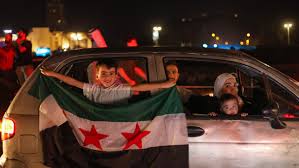In a move hailed as historic by Syrian officials and regional observers alike, U.S. President Donald Trump on Tuesday announced the complete lifting of American sanctions on Syria. The declaration, made at the Saudi-American Investment Forum in Riyadh, marks the most profound shift in Washington’s policy toward Damascus in over a decade—triggering immediate diplomatic, economic, and symbolic repercussions across the region.
“It’s time to give Syria a chance,” Trump said. “We hope the new government succeeds. Good luck, Syria—show us something special.”
The announcement followed high-level consultations with Saudi Crown Prince Mohammed bin Salman and Turkish President Recep Tayyip Erdoğan, both key players in efforts to reintegrate Syria into the regional and international fold following the fall of Bashar al-Assad’s regime in December 2024. Shortly after the speech, Trump met Syria’s new president, Ahmad al-Sharaa—the first meeting between American and Syrian heads of state since the start of the uprising in 2011.
From Isolation to Engagement
Syria has been subject to escalating U.S. sanctions since 1979, when it was first designated a state sponsor of terrorism. These restrictions expanded over the years to target military trade, oil exports, banking transactions, and, under the 2020 Caesar Act, reconstruction and foreign investment.
The Trump administration’s decision represents a dramatic departure from decades of punitive isolation. Beyond lifting economic barriers, the move symbolically recognises the new Syrian leadership and underscores Washington’s evolving Middle East strategy: conditional re-engagement, particularly when backed by regional allies.
Damascus: “A New Era of Opportunity”
The response from Syria’s transitional government was swift and upbeat. Finance Minister Mohammad Yasser Barniyeh called the development “a transformative moment” that could “unlock global financial integration and catalyse investment at scale.”
“Syria is rich with investment opportunities in energy, infrastructure, education, and finance,” he said. “We are ready to rebuild—now we finally can.”
Barniyeh also linked the sanctions’ removal to promised reforms, pledging strengthened anti-corruption measures, investor protections, and judicial modernisation. He urged international stakeholders to seize the moment and re-engage with Syria’s economic reconstruction.
A Rebounding Currency
Central Bank Governor Abdelkader Housriyeh described the sanctions relief as critical for restoring monetary stability. Speaking to state media, he reported a 16.5% appreciation of the Syrian pound against the U.S. dollar within hours of the announcement.
“This is not just an economic shift—it is a psychological one,” he said. “We are finally reconnecting with the global financial system.”
Housriyeh also expressed gratitude to Saudi Arabia, Qatar, Turkey, and European partners for their diplomatic efforts to end Syria’s isolation.
Kurdish Support and Unprecedented Unity
In a rare show of unity, Kurdish political and military leaders welcomed the decision. Syrian Democratic Forces (SDF) commander General Mazloum Abdi publicly thanked President Trump, calling the decision a launchpad for inclusive reconstruction and stability.
Syrian Kurdish politician Shalal Kado described the sanctions relief as “a moral, human, and political necessity,” adding that it marks the end of a “dark era.” The Syrian Democratic Council echoed this sentiment, commending Saudi Arabia’s role and expressing hope for broader political settlements.
A Cautious Road Ahead
While Damascus has embraced the shift with optimism, international analysts have urged caution. The original sanctions targeted a regime accused of systemic repression and war crimes. Their removal hinges on hopes that the new leadership will embrace a more inclusive and transparent governance model.
Much now depends on whether Syria’s war-battered institutions can translate this moment into meaningful reform. For now, however, the atmosphere is one of cautious optimism.
“This is the beginning of something new,” said a Kurdish journalist in al-Hassakeh. “For the first time in years, we can speak of Syria’s future—not just its past.”


